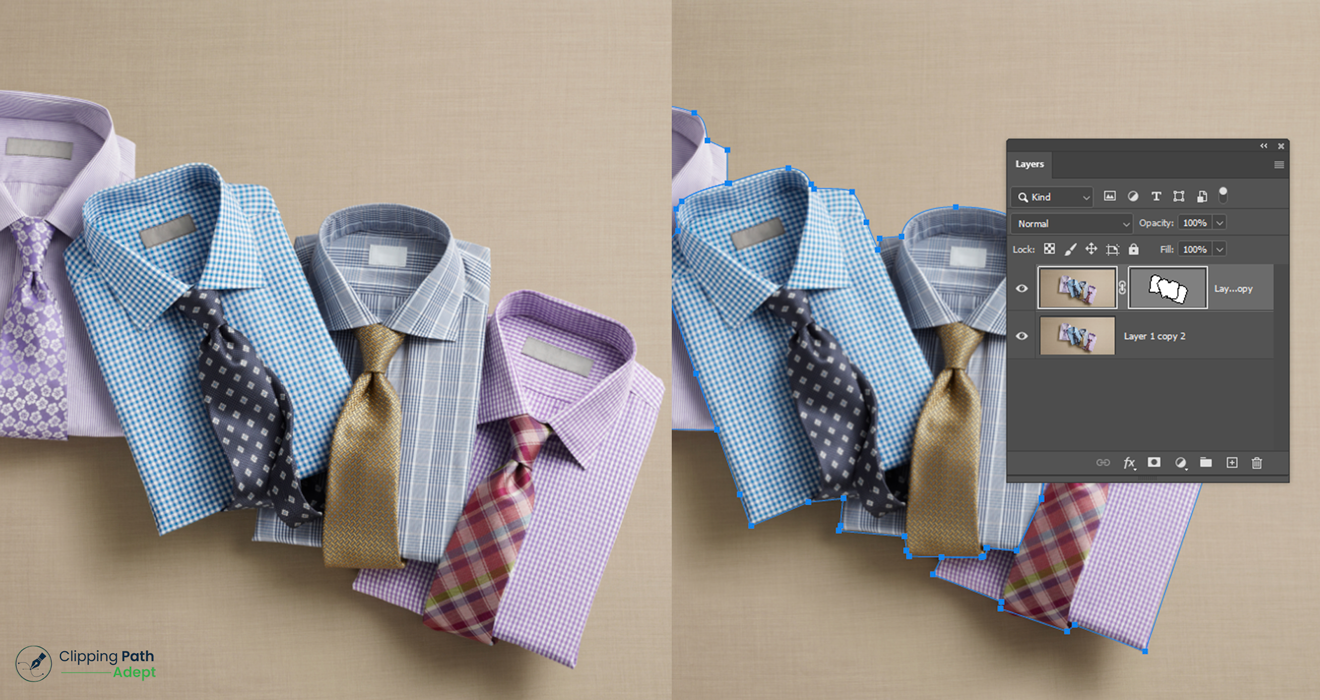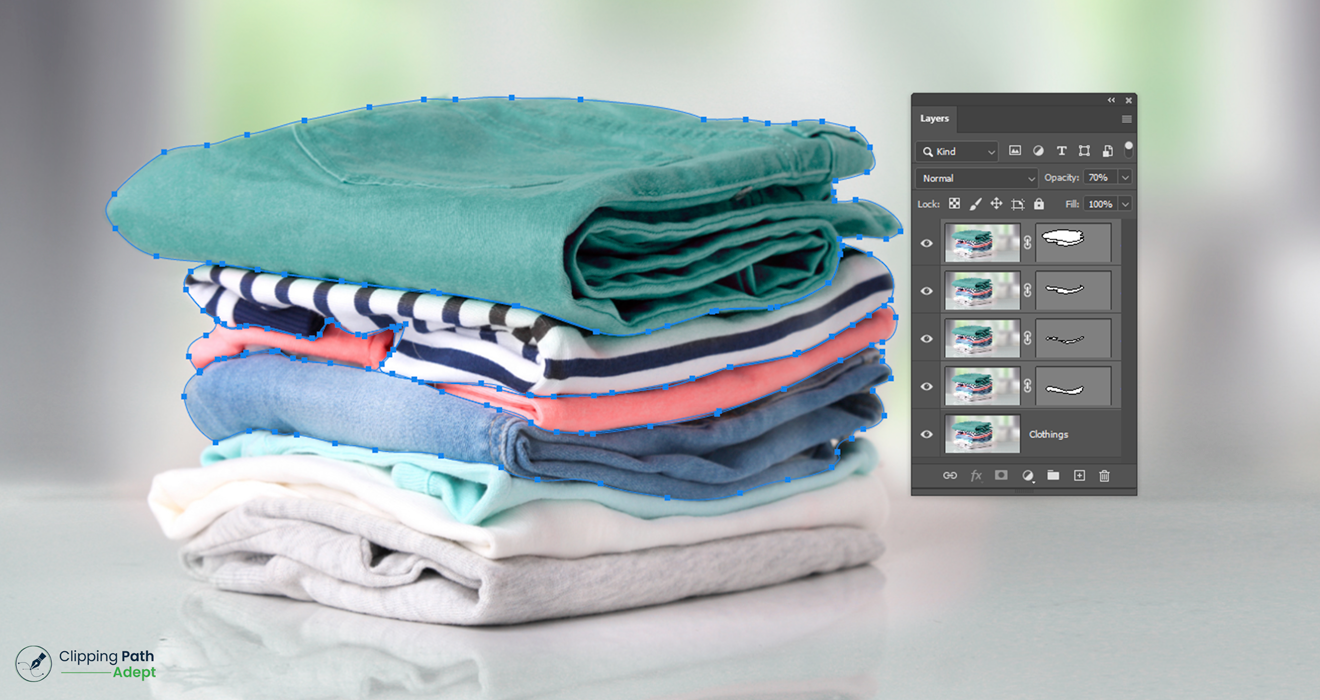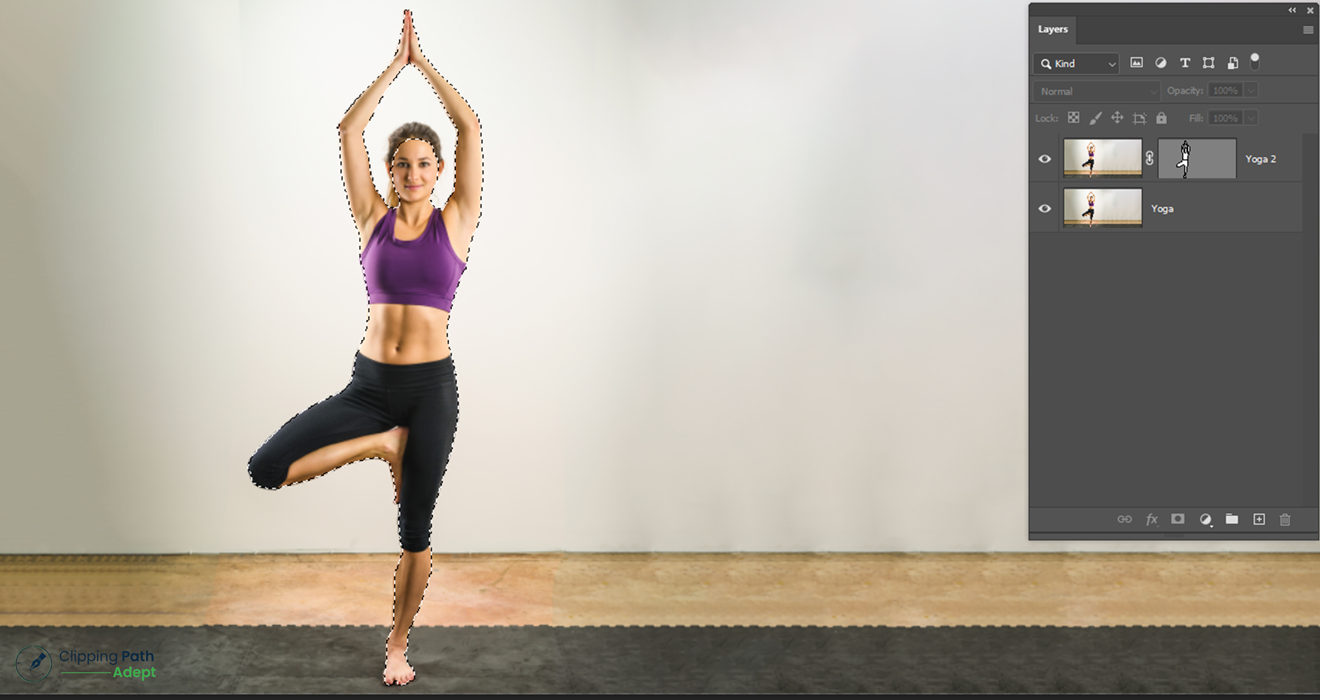
Have you ever tried to make your product images look perfect but ended up frustrated? Messy edges and uneven backgrounds can ruin a photo. You are not alone. Many businesses face the same problem. Also, it’s occurring using the wrong clipping path. Some photos only need a basic clipping path, while other images need multiple clipping paths to capture all the information. Using the right path will save time and make your images look more professional. In an e-commerce site, everything is important. Small product details matter here.
At Clipping Path Adept, we are experts in all kinds of clipping. Our team makes every edge clean, colors balanced, and backgrounds perfect. Whether it is one photo or a full catalog, we make sure every image is ready to sell. Our team of experts can help you choose the right clipping path for your image.
In this article, we will explain the difference between the Basic Channel and the Multi-Crop Channel. Lastly, you will know what types of paths are best for your project.
Understanding Clipping Paths
A clipping path is a line drawn around an object to separate it from its background. Designers use tools such as the Pen Tool in Photoshop or Illustrator to accomplish this task more efficiently. This makes it easy to remove, edit, or modify the background image while keeping the image crisp and clear. This is very important for online stores and marketing materials.
It helps to know the difference between clipping, masking, and compound paths. Clipping uses vector lines to hide or show parts of an image. Masking works with layers to hide or blend areas smoothly. It’s great for hair, fur, or see-through objects. Compound paths in Illustrator let you combine multiple shapes for more detailed edits and effects.
Using vector paths keeps images sharp and easy to edit at any size. They are key for layer editing, masking, and professional photo retouching. A good clipping path makes your product photos look polished, consistent, and ready to impress shoppers.
Two Main Types of Clipping Paths
Clipping paths are very important in professional image editing. They help separate objects from their backgrounds. This makes images look clean and polished. There are two main types of clipping paths: Basic Clipping Path and Multiple Clipping Path.
It’s important to know the difference. Each type works best for different kinds of images. A basic clipping path is great for simple products. A multiple clipping path is best for detailed or complex images. It gives high-quality, professional results.
Choosing the right type makes sure your product photos look neat, consistent, and ready for online stores or marketing. It helps your products become more perfect and engage more customers.
What Is a Basic Clipping Path?

A basic clipping path is to draw a line on an object by dividing it from its background. This is one of the most popular methods to edit images. By isolating an image object, the expert can remove, modify, or expand the background without changing its original subject.
The main purpose of a basic clipping path is simple: it makes images clean and sharp quickly. It works best for products with simple shapes and smooth edges where detailed editing is not needed.
Even though it is simple, a basic clipping path gives professional-looking results. It is often the first step in product image editing services.
The uses of Basic Clipping Path
A basic clipping path is very helpful in product photo editing. It helps to make clear and professional images for the online store and catalogs.
Best Uses:
- Product Image for E-Commerce: Isolate product photos such as clothing, furniture, or electronics for e-commerce sites.
- Easy Background Removal: Easily remove the background to make a white background.
- Fast and affordable: Basic clipping path saves time, and affordable pricing also delivers better results.
Categories such as clothing, jewelry, and other ordinary product images benefit from this path. If your product photos need simple isolation without complex details, a basic clipping path is the best choice for fast and polished images.
How It Works
A basic clipping path is the easiest and most useful way to cut out an object from the background. It is most of the time used for image editing because it produces crisp and clear results with very little effort.
Here’s how it works:
- Open the image in Photoshop or Illustrator – paste the product image into a new document and get to work.
- Select the Pen tool – This tool will allow you to draw the vector shape where you want to draw it.
- Carve a path around the piece – fold the edges together to form a closed path. This leads to which part of the image is visible.
- Use Path Isolation – when a path ends, the object is automatically separated. You can easily erase or change the background.
- Filter and Save – Change the direction if necessary, then save it to continue editing or exporting.
The strength of a basic clipping path is its simplicity and precision. It keeps the original image safe while giving a clean, professional look. Unlike compound paths, which handle complex shapes, a basic clipping path is perfect for simple product images. This process is fast, efficient, and suitable for print, e-commerce, or business applications.
The Advantages of a Basic Clipping Path
Basic Clipping Path has its advantages. It is an ordinary method for editing product images, especially basic images that do not require the use of complicated adjustments.
Advantages are:
- Faster Workflow – One path around a product isolates it quickly, saving time on editing.
- Easy Editing – Using this method, you can easily edit with layers and retouch photos.
- Budget savings – Not as expensive as other editing service methods.
- Great for Simple Products – Best for product items, like bottles, boxes, or clothes.
Using a basic clipping path confirms your photos stand out for your online business. It saves time and money while giving clean, polished results. It’s a smart and efficient choice for straightforward product photo editing.
What Is a Multiple Clipping Path?

A multiple clipping path is an editing technique that uses several paths to separate different parts of an image. Unlike a basic clipping path, which isolates only one object, a multiple clipping path allows editors to work on each part of a complex product separately. This offers the power and advantage of a layered approach.
The main goal of multiple clipping paths is to create detailed images. This is suitable for images with multiple layers, complex patterns, or various colors and textures. By separating each layer, the editor can adjust the color, lighting, shadows, and other effects efficiently.
Multiple clipping paths are widely used in professional image editing, e-commerce, catalogs, and high-end marketing. They make sure every part of a product looks polished and consistent.
Uses of a Multiple Clipping Path
A multiple clipping path works best for complex product images that need careful editing:
- Complex Product Photos – Works for intricate items like jewelry sets, bundles, or multi-angle shots.
- High-End E-Commerce and Catalogs – Makes every part of the product look perfect for online stores and printed catalogs.
- Flexible Editing of Parts – Each component can be adjusted for color, shadows, brightness, or texture.
- Multi-Object Products – Ideal for bundled items or products with several components.
Using multiple clipping paths ensures complex products look perfect. It keeps all images consistent and ready for professional use.
How It Works
A multiple clipping path is an advanced method for editing product photos. It helps editors work on each part of a product separately.
Step-by-Step Workflow:
- Open the Image – Start with a high-resolution product photo in Photoshop or Illustrator.
- Create Separate Paths – Use the Pen Tool or vector tools to draw paths around each part that needs editing.
- Use Layers to Organize – Put each path on a separate layer. This allows easy adjustments and keeps the original image safe.
- Apply Advanced Masking – For detailed or overlapping areas, use masking to refine edges and make smooth transitions.
- Adjust Colors and Retouch – With each part isolated, you can correct colors, adjust brightness, and retouch details.
- Finalize and Export – Save the finished image in the desired format. It’s ready for e-commerce, catalogs, or marketing.
Using multiple clipping path service gives editors full control over complex products. Unlike a single clipping path, it allows detailed editing with accuracy. This makes it perfect for high-end product photos, masking, compositing, and professional-quality visuals.
Advantages of a Multiple Clipping Path
A multiple clipping path is very useful for complex product images. It lets editors work on each part of a product separately. This will give you more control and advantages.
Best Advantages:
- High Accuracy for Detailed Images – Suitable for different materials, overlapping pieces, or different patterns.
- Color Correction and Retouching – Each layer can be adjusted for brightness, hue, and shadow to maintain a high-quality image.
- High-quality images – Create clean, professional, and high-quality images for online stores, posts, and ads.
- Layer-Based Editing– Use Photoshop layers, making them more flexible and easier to edit later.
Using multiple clipping paths makes even the most complex products look flawless.
Comparison Between Basic and Multiple Clipping Paths
Selecting the right clipping path is important for professional product photos. Both basic and multiple clipping paths have their uses. Knowing the difference helps you choose the best one for your images.
Side-by-Side Comparison
|
Feature |
Basic Clipping Path |
Multiple Clipping Path |
|
Complexity |
Simple, one path around the object |
Advanced, multiple paths for each part of the product |
|
Accuracy |
Suitable for straightforward objects |
High precision for detailed or multi-part products |
|
Editing Flexibility |
Limited adjustments |
Allows advanced color correction, retouching, and layer-based edits |
|
Time & Cost |
Faster and more cost-effective |
Takes more time and is higher in cost due to complexity |
| Best Use Cases | Single-object products with clean edges |
Complex products, multi-part items, or e-commerce images |
Using the Right Clipping Path
Selecting the right clipping path will give you a crisp and clear image. A common mistake is using a basic clipping path for objects with many parts or details, like jewelry, folded clothes, or layered products. This can cause jagged edges or missing details. Rushing the process can also lower quality and create mistakes.
Always check how complex the object is before picking a clipping path. Review the final image carefully to make sure nothing is missing and every part is properly cut out.
How to select the right Clipping Paths
- Image Complexity – A simple material with smooth edges, a one-part surface, best for Basic Clipping path. Complex objects with different sizes, shapes, or colors require multiple clipping paths
- Editing Requirements – To change the color, shadows, or shape of different layers, select multiple clipping paths. Use a basic path if only the background needs removing.
- E-Commerce or Catalog Use – Simple product images with fast turnaround can use basic clipping paths. Multiple clipping paths work best for high-end images or multi-part, different-shaped product images.
Example item:
- Basic Clipping Path – bottles, boxes, simple clothes, ordinary jewelry, and images.
- Multiple Clipping Path – Jewelry sets, patterned clothes, furniture bundles, electronics with several parts.
Need a Reliable Partner for Clipping Path Services?
Outsourcing clipping path services is the best way to get high-quality, clear images for business. This saves time, reduces costs, and increases efficiency. Clipping Path Adept offers both basic and multiple clipping path services, which can be manually adjusted to keep your products looking their best.
Why Choose Clipping Path Adept?
All images are manually edited by expert editors. Our professional experts confirm exact path isolation and detailed results. Whether basic clipping path or multiple clipping paths, our expert can handle all the image editing services.
Many businesses in form UK and the US trust us; our services are reliable and affordable. Pricing starts at $0.45 per image for basic clipping paths and $0.95 per image for multiple clipping paths. This makes high-quality editing easier, even on large projects.
Our Easy Workflow:
- Upload your product photos via our secure platform or email.
- Decide if you need a basic or multiple clipping paths and add other metrics.
- Our experts handle the editing process, including path isolation, masking, and color correction.
- Recheck your edited images and ask for changes if necessary.
- Save or export. You’ll get high-quality images optimized for e-commerce, printing, or advertising.
Clipping Path Adept offers a free trial so you can see our work quality before you invest. Outsourcing Clipping Path Adept provides you with a reliable, consistent, and affordable solution for all your image editing needs.
Conclution
Knowing the right type of clipping path is key to great product photos. Basic clipping paths are best for simple products. They remove the background fast, give clean edges, and save time and money. Multiple clipping paths are for more complex products. They let you fix colors, shadows, and details so your images look perfect. Clipping paths make your images sharp and clear. This helps your products stand out on online stores, catalogs, and ads. Using the wrong path can make photos look messy and unprofessional. That can hurt your sales.
Professional clipping path services make editing easy. The editors inspect each edge, adjust colors, and ensure all images are ready for sale. Don’t let messy images hold your business back. Upload your photos now and let Clipping Path Adept make them bright, clean, and ready to sell!
Frequently Ask Question
What is the difference between basic and multiple clipping paths?
A basic clipping path isolates one object from its background. It is best for simple products with clear edges. A multiple clipping path uses several paths to separate different parts of a complex product. This allows the editors to adjust the colors, shadows, and hues of each layer.
What is the difference between a clipping path and a compound path?
A clipping path is a single vector path used to remove the background from an object. A compound path combines multiple paths into a single method. This is great for cropping images with holes or overlapping areas in Photoshop or Illustrator.
What is the difference between clipping and masking?
Clipping completely separates an object from its background using a vector path. Masking hides or shows parts of an image without removing the background
Which is the most common tool for a clipping path in Photoshop?
The Pen Tool is the most precise and commonly used. It creates smooth and accurate paths for both basic and multiple clipping paths.
What are the benefits of using clipping paths?
Clipping paths make images clean and professional. They remove or replace backgrounds, keep products consistent, improve visual appeal, and save time when editing many images for e-commerce or catalogs.

